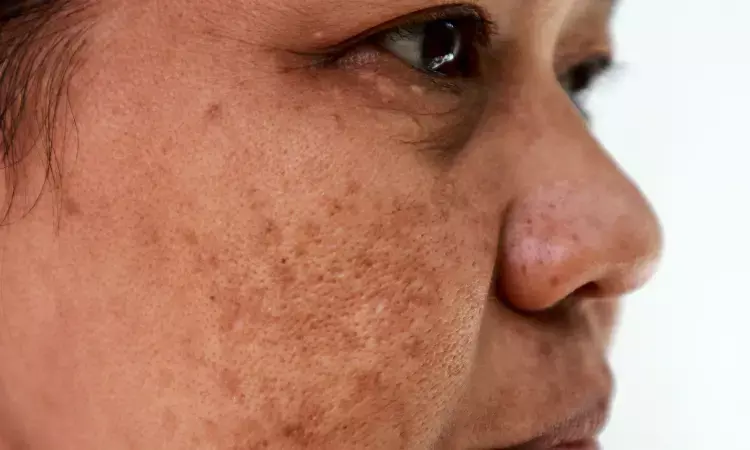- Home
- Medical news & Guidelines
- Anesthesiology
- Cardiology and CTVS
- Critical Care
- Dentistry
- Dermatology
- Diabetes and Endocrinology
- ENT
- Gastroenterology
- Medicine
- Nephrology
- Neurology
- Obstretics-Gynaecology
- Oncology
- Ophthalmology
- Orthopaedics
- Pediatrics-Neonatology
- Psychiatry
- Pulmonology
- Radiology
- Surgery
- Urology
- Laboratory Medicine
- Diet
- Nursing
- Paramedical
- Physiotherapy
- Health news
- Fact Check
- Bone Health Fact Check
- Brain Health Fact Check
- Cancer Related Fact Check
- Child Care Fact Check
- Dental and oral health fact check
- Diabetes and metabolic health fact check
- Diet and Nutrition Fact Check
- Eye and ENT Care Fact Check
- Fitness fact check
- Gut health fact check
- Heart health fact check
- Kidney health fact check
- Medical education fact check
- Men's health fact check
- Respiratory fact check
- Skin and hair care fact check
- Vaccine and Immunization fact check
- Women's health fact check
- AYUSH
- State News
- Andaman and Nicobar Islands
- Andhra Pradesh
- Arunachal Pradesh
- Assam
- Bihar
- Chandigarh
- Chattisgarh
- Dadra and Nagar Haveli
- Daman and Diu
- Delhi
- Goa
- Gujarat
- Haryana
- Himachal Pradesh
- Jammu & Kashmir
- Jharkhand
- Karnataka
- Kerala
- Ladakh
- Lakshadweep
- Madhya Pradesh
- Maharashtra
- Manipur
- Meghalaya
- Mizoram
- Nagaland
- Odisha
- Puducherry
- Punjab
- Rajasthan
- Sikkim
- Tamil Nadu
- Telangana
- Tripura
- Uttar Pradesh
- Uttrakhand
- West Bengal
- Medical Education
- Industry
JAK inhibitor ruxolitinib promising in reducing severity of rare form of sclerosis: NEJM

A study published in The New England Journal of Medicine has mentioned the results of a clinical series demonstrating the role of Janus kinase (JAK) inhibitor ruxolitinib in easing the symptoms of disabling pansclerotic morphea (DPM), both inflammatory and dermatologic.
The etiology of DPM remains unknown, and the mortality rate is high. It is already known that DPM is an inflammatory disorder and has a rare prevalence. The main characteristic complications of this include poor wound healing, fibrosis, cytopenias, hypogammaglobulinemia, and squamous-cell carcinoma.
The present study evaluated four patients from three unrelated families (autosomal dominant pattern DPM inheritance). Genomic sequencing independently identified three heterozygous variants in genes-specific region encoding for signal transducer and activator of transcription 4 (STAT4). Primary skin fibroblast and cell-line assays defined the functional nature of the genetic defect.
The results of the study are:
- The three novel heterozygous missense gain-of-function variants in STAT4 were revealed by Genome sequencing.
- In vitro, primary skin fibroblasts presented enhanced secretion of interleukin-6, with impaired wound healing, contraction of the collagen matrix, and matrix secretion.
- Inhibition of Janus kinase (JAK)–STAT signalling with ruxolitinib improved hyperinflammatory fibroblast phenotype.
- Using JAK inhibitors led to the resolution of inflammatory markers and clinical symptoms. One patient had near resolution of the chest rash and oral ulcers following 11 months of therapy. By 18 months, lesions were cleared on the patient's arms and legs.
Other patients showed improvement in pulmonary hypertension, reduced frequency of IV immunoglobulin, and neutropenia resolution. There was a reduction in inflammatory markers and anaemia.
- No adverse events were reported.
- Single-cell RNA sequencing revealed expression patterns consistent with an immunodysregulatory phenotype that was appropriately modified through JAK inhibition.
This study identified genetic basis and inflammatory cytokine interleukin-6 (IL-6) as the main culprits in this rare condition.
They said, “Gain-of-function variants in STAT4 caused DPM in the families we studied.”
Ruxolitinib attenuated dermatologic and inflammatory phenotype (in vitro and affected family members).
As acknowledged, the study received funding from the American Academy of Allergy, Asthma, and Immunology Foundation and others.
Further reading:
BDS, MDS in Periodontics and Implantology
Dr. Aditi Yadav is a BDS, MDS in Periodontics and Implantology. She has a clinical experience of 5 years as a laser dental surgeon. She also has a Diploma in clinical research and pharmacovigilance and is a Certified data scientist. She is currently working as a content developer in e-health services. Dr. Yadav has a keen interest in Medical Journalism and is actively involved in Medical Research writing.
Dr Kamal Kant Kohli-MBBS, DTCD- a chest specialist with more than 30 years of practice and a flair for writing clinical articles, Dr Kamal Kant Kohli joined Medical Dialogues as a Chief Editor of Medical News. Besides writing articles, as an editor, he proofreads and verifies all the medical content published on Medical Dialogues including those coming from journals, studies,medical conferences,guidelines etc. Email: drkohli@medicaldialogues.in. Contact no. 011-43720751


